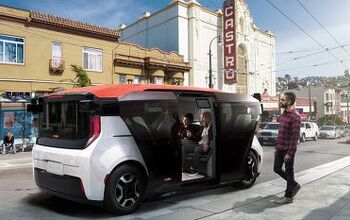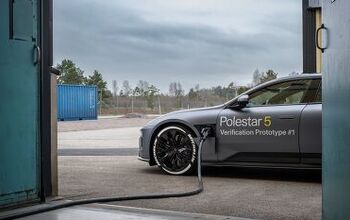'As Quickly As Possible': Volkswagen Partnership Seen As Key to Ford's Overseas Hopes

Ford Motor Company is engaged in hurried discussions with Volkswagen, with the German automaker seen as a sure-fire way to reverse falling fortunes in overseas markets. Ford needs help in Europe and Latin America, especially — a situation made clear in Thursday’s quarterly earnings report.
Since signing a Memorandum of Understanding with VW in June, the scope of Ford’s partnership has expanded from its initial focus on commercial vehicles. There was already room in the MOU’s wording for the two companies to go further. Now, it looks almost certain that passenger vehicles will become part of the plan.
According to Ford chief financial officer Bob Shanks, things are moving fast. Fast, because they have to. Speaking to Bloomberg, Shanks basically said nothing’s off the table.
“We’re having a very broad set of discussions about how we can help each other around the world,” said Shanks. “Collaboration isn’t being limited in any way whatsoever, whether it’s different types of technology, product segments or geography.”
Technology sharing is usually the main reason for an OEM tie-up, though the possibility of jointly-developed vehicles isn’t out of the question. While Ford’s next-generation Focus is seen as a helping hand in Europe, one model does not a recovery make. Thanks to a bevy of small cars, Volkswagen has both the European and Latin American markets in the palm of its hand, and has for quite some time.
It’s not just VW that Ford’s in bed with. A similar wide-ranging partnership with India’s Mahindra & Mahindra is seen as key to expanding Ford’s footprint (and profits) in that market. China gets a lot of press, but India’s expanding middle class and growing thirst for passenger vehicles holds much potential for makers of affordable vehicles.
However, while India remains a work in progress, plugging the financial leaks in Europe and Latin America is top of mind. The two regions are money sinks for Ford.
“We have a history with VW. We get along with them. And if you look at the strengths and weaknesses of each of us, we match up really, really well,” Shanks said. “We’re trying to get things done as quickly as we can because we’re all trying to improve the fortunes of each of our companies. So, we’re moving to get clarity and get moving on to the actual collaboration as quickly as possible.”
Details on what fruit this partnership will bear should emerge early next year, Shanks claims, but it won’t be fleshed out all at once. Don’t expect a “big bang,” he said.
“It will be done as fast as we possibly can, but it will be done in chunks and pieces.”
[Image: Ford Motor Company]

More by Steph Willems
Latest Car Reviews
Read moreLatest Product Reviews
Read moreRecent Comments
- AZFelix Let's forego all of this dilly-dallying with autonomous cars and cut right to the chase and the only real solution.
- Zelgadis Elantra NLine in Lava Orange. I will never buy a dirty dishwater car again. I need color in my life.
- Slavuta CX5 hands down. Only trunk space, where RAV4 is better.
- Kwik_Shift_Pro4X Oof 😣 for Tesla.https://www.naturalnews.com/2024-05-03-nhtsa-probes-tesla-recall-over-autopilot-concerns.html
- Slavuta Autonomous cars can be used by terrorists.


































Comments
Join the conversation
I am more inclined to buy a Ford car than a VW based on my experience. I don't dislike Ford but I see that they could eventually become a takeover target which I would say the same thing for GM. The auto industry will see more consolidation and more emphasis on cost reduction and efficiencies. As for trucks it is a matter of how much longer the Chicken Tax will exist for now it is safe under the current administration but after that who knows. Every manufacture is looking at the bottom line and how to reduce costs and eliminate low profit products. If you have to make a less expensive and less profitable vehicle then you are for the most part forced to make it in a lower cost country with lower paid workers. The current administration takes away the advantage of making lower profit vehicles in lower cost countries and that is a major reason why Ford is getting out of the car business along with increasing profits and increasing stock price. Increase profitability then you become more desirable as a take over target and the stockholders will want to take the profits from a takeover. If a company loses money and is not profitable then it will either declare bankruptcy and/or be acquired or if a company reduces costs and builds up cash reserves then it is a target from competitors that want their assets and the stockholders want the profit from an acquisition.
Remember, if you get in bed with any German company it ends up not being a merger of equals. Chrysler never recovered from such a deal. I am not surprised Hackett has decided to sell out Fords ability to engineer and design cars. Ford is a national disgrace, which will eventually have to be bailed out by the government.